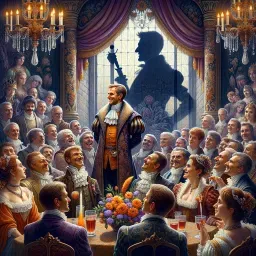What is past is prologue

0
0
0
0
- Meaning
- The phrase "What is past is prologue" implies that all events that have occurred up to a certain point create the context for where we are now, and they lay the groundwork for what is to come. In a broader sense, it means that understanding history is crucial for predicting and planning the future. Just like how a prologue sets the scene for the events to come in a play, our past experiences and actions set the framework for our present and future.
- Allegory
- The grand, ancient book symbolizes the weight and importance of history. The glowing pages represent the illumination and understanding that comes from studying the past. The winding path leading to a bright sunrise signifies the journey from past to future, highlighting that the past lays the groundwork for what is to come. The various historical scenes along the path depict key moments that shape our present, while the reflective pools show transformation and learning. The increasingly vibrant trees symbolize growth and the promise of a better future as we progress along the path of history. This image visually conveys the idea that the past sets the stage for the future, suggesting hope, continuity, and the importance of learning from history.
- Applicability
- This phrase can be applied to numerous aspects of personal life and broader human activities. For instance, in a personal development context, acknowledging that past experiences shape who we are can help one understand their current behavior and decisions, and inform better choices for the future. In business, analyzing past performance can guide strategic planning and forecasting. Essentially, it underscores the importance of learning from history to influence and improve future outcomes.
- Impact
- The phrase has had a significant impact on both literature and popular culture. It's often cited in political speeches, historical analyses, and motivational contexts to emphasize the idea that understanding the past is vital for shaping the future. It has been influential in fields as diverse as historiography, psychology, and education.
- Historical Context
- The phrase originates from William Shakespeare's play "The Tempest," written around 1610-1611. This was a period rich in exploration, scientific discovery, and political intrigue in Europe. The themes of fate, destiny, and the interplay between past and future were very much in the cultural ethos of the time, hence the resonance of this statement.
- Criticisms
- Criticisms of this phrase might arise from the belief that it overemphasizes the deterministic nature of the past, potentially underestimating the role of free will, spontaneity, and individual agency. Some might argue that while the past is informative, it should not be seen as an unchangeable script that dictates the future.
- Variations
- There are not many direct variations of this phrase, but the concept is universally recognized. In some cultures, similar wisdom might be embedded in different idioms or stories that stress the importance of historical awareness and learning from past experiences.
-

The golden age is before us, not behind us.
-

Suspicion always haunts the guilty mind.
-

Beware the Ides of March.
-

Suae quisque fortunae faber.
-

Some rise by sin, and some by virtue fall.
-

No legacy is so rich as honesty.
-

A horse! a horse! my kingdom for a horse!
-

If to do were as easy as to know what were good to do, chapels had been churches, and poor men's cottages princes' palaces.
-

All the world's a stage, and all the men and women merely players.
-

There's daggers in men's smiles.
-

The lady doth protest too much, methinks.
-

Things without all remedy should be without regard: what's done is done.
No Comments